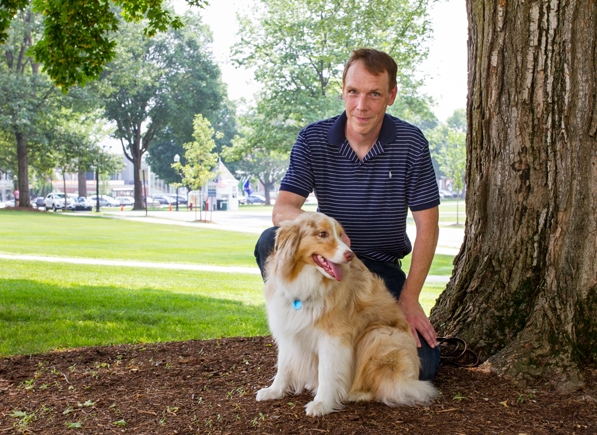From antiquity through the early 19th century, anyone studying the works of Plato began with a fourth-century text known as Alcibiades, says Hakan Tell, an associate professor of classics.

Associate Professor of Classics Hakan Tell brings his dog, Selma, to the office with him every day. (Photo by Lars Blackmore)
In the dialogue, Socrates, much like a modern first-year faculty adviser, tries to persuade the young Alcibiades (who would grow up to be a powerful, if traitorous, general and politician in Athens) of the value of what today might be called a liberal arts education.
But like Alcibiades the man, Alcibiades the text fell out of favor, and until recently scholars have questioned whether Plato even wrote it.
So when Sunoikisis—a national consortium of classics programs sponsored by Harvard’s Center for Hellenic Studies in Washington, D.C.—invited Tell to be the faculty consultant at a fourth-century Greek literature curriculum development seminar for liberal arts college faculty from around the country, he thought Alcibiades would be the perfect primary text to get the discussion started.
“There’s emerging scholarship trying to rehabilitate this dialogue, so I thought it would be a fantastic thing to read,” says Tell. “I wanted to provoke them into thinking about the canon, about the kind of texts we were teaching.”
Sunoikisis allows classics faculty and students from smaller liberal arts schools to have access to resources and opportunities more typical of larger research universities.
Tell is the first scholar from Dartmouth to serve as a faculty consultant for a Sunoikisis seminar. The weeklong session brought together professors from nine colleges and universities—from Carthage College in Wisconsin to Southwestern University in Texas—to collaborate on developing an undergraduate course that they will teach on their own campuses this coming fall.
“Sunoikisis means a coming together. Specifically, the word refers to the alliance formed by Greek city-states in their revolt against the Athenian empire in 428 BCE, and it goes back to the Greek historian Thucydides,” Tell says.
The undergraduate course will have a traditional format, with a twist: Once a week throughout the term, students from all the schools will join a “common session,” hosted online and led by a rotating roster of participating faculty, including Tell.
“This is a hybrid format of teaching humanities courses on a collaborative, inter-college platform,” he says. Students and faculty will be able to tap into a larger network of peers interested in studying the classical world.
“Locally, each professor has complete control of the course content. But the hybrid format lets professors teach material that they couldn’t otherwise teach, because they don’t have the enrollment,” says Tell.
In Washington, D.C., faculty read and discussed primary and secondary texts and brainstormed writing prompts for their students that will encourage them to use the dialogue between Socrates and Alcibiades to examine their own educational choices.
For Tell, much of the value of leading the curriculum development seminar was the coming together of faculty from many perspectives. “It was like a graduate seminar times 30,” he says. “There’s just the sheer joy of collaborating with colleagues from different institutions.”
